In the summer, fruit is the top choice to cool down, refresh you, and awaken your senses. The following low-carb fruits are good for the heart and help you lose weight and fight aging.
Sweet apples, mouth-watering watermelons, delicious peaches,… These fruits are not only beautiful to look at but also have many health benefits.
According to a study published in the American Heart Association’s journal Circulation, eating lots of green vegetables and fruits reduces the risk of cardiovascular disease, cancer and reduces the risk of death from chronic diseases in general by 10-13%.
Another study in the nutrition journal Advances in Nutrition also showed that fruits and green vegetables are a source of fiber that helps the body reduce the risk of cardiovascular disease and obesity.
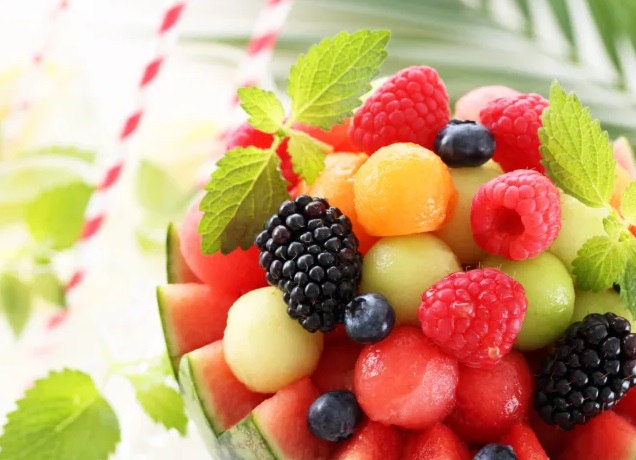
Fruits not only cool you down on summer days but also help you stay young.
In fact, many low-carb fruits have health benefits such as reducing the risk of type 2 diabetes, heart disease, lowering cholesterol, and weight loss.
Most fruits provide about 15 grams of carbohydrates per 1/2 cup serving. However, some fruits contain as little as 5 grams of carbs per serving.
The fiber in fruits and vegetables has many health benefits. Fiber can slow down the absorption of sugar, create a feeling of fullness, help maintain stable blood sugar levels, and support weight control.
Many low-carb fruits are often rich in fiber, which brings even more health benefits. Here are some low-carb fruits that are delicious, have the effect of cooling down on summer days, and are very good for your health.
1. Coconut/ Coconut Water
2/3 cup contains 15.2g total carbs, 9g fiber, and 6.2g starch.
Coconut provides a source of healthy fats and fiber while being relatively low in carbs. Additionally, coconut water is a source of electrolytes and minerals that help rehydrate and cool down on hot summer days.
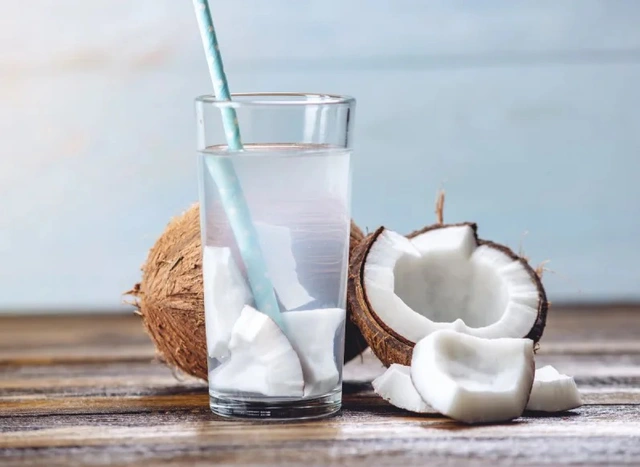
Coconut water is rich in electrolytes and minerals, cooling on summer days
Although coconut meat is a rich source of fiber, it is relatively high in fat and calories, so if you want to lose weight, you should only eat it in moderation.
2. Berries
Berries such as mulberries, strawberries, blueberries, raspberries, etc. contain only about 8-12g of carbs but contain up to 1.8 – 6.5g of fiber in a 2/3 cup serving.
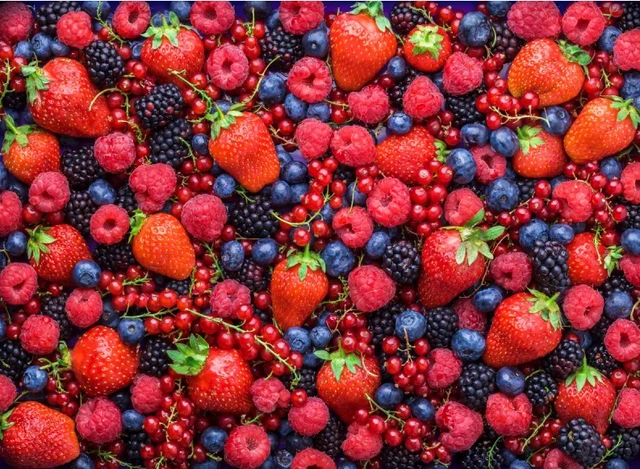
Berries are rich in antioxidants, which are beneficial for brain and gut health.
According to the publication in the medical journal Molecules, berries are rich in antioxidants that are beneficial for the intestines and brain, while protecting you from inflammatory disorders, metabolic disorders, and preventing cancer and cardiovascular disease.
In addition to being rich in fiber, berries are also rich in vitamin C, potassium, and folate, but contain absolutely no fat or cholesterol.
3. Apricots
Apricots have been cultivated by humans for more than 4,000 years. According to traditional medicine, apricots have the effects of pain relief, deworming, anti-asthma, fever reduction, antiseptic, expectorant, laxative, etc. These are the uses of apricots that have been passed down in traditional medicine in the Himalayas.
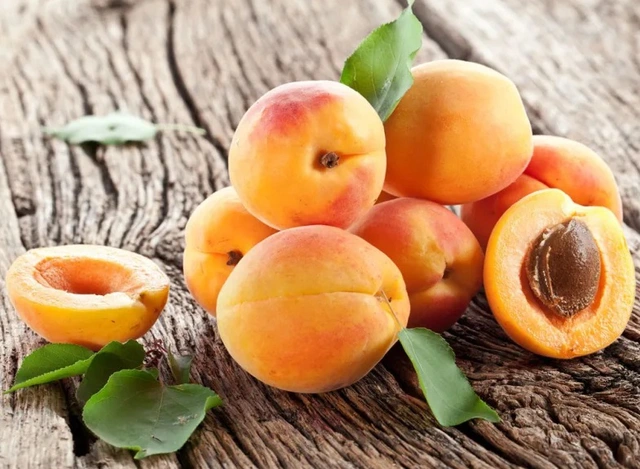
According to folk medicine, apricots have the effect of expelling worms, reducing fever, expectorant, and laxative.
A 2/3 cup serving of apricots contains only 11.1 grams of carbs, while also containing 2 grams of fiber and 9.1 grams of net carbs. In addition to fiber, apricots are also rich in vitamin A and vitamin C.
4. Grapefruit
Grapefruit is known for its low-calorie and low-carb properties, while also being rich in fiber and vitamin C. Grapefruit has the effect of boosting the immune system, improving cardiovascular health and supporting weight loss.
5. Pears
The total carbs in a 2/3 cup serving of pears is 15.2 grams, fiber is 3.1 grams and starch is 12.1 grams.
Pears have long been used in dishes and folk medicine in many countries. Pears are believed to have anti-inflammatory properties and prevent the risk of stroke.
In addition, pears are one of the fruits that help reduce the risk of diabetes as well as prevent constipation and improve intestinal health.
Pears are a rich source of fiber and vitamins. A study published in the journal Nutrition showed that eating pears helps with weight loss.
6. Apples
2/3 cup of apples contains 14.8g of carbs and 2.1g of fiber. Apples are rich in fiber and antioxidants, helping you reduce the risk of diabetes as well as cardiovascular disease and cancer. Eating apples is also good for intestinal and brain health.
7. Watermelon
Although sweet and cool, the carb content in watermelon is very low. 2/3 cup of watermelon contains only 7.55g of carbs. According to research published in the International Journal of Food Properties, watermelon has the effect of reducing the risk of skin diseases and preventing asthma. Eating watermelon also helps you reduce the risk of high blood pressure, diabetes, cardiovascular disease and cancer. According to this research, watermelon is good for obese people who want to lose weight, pregnant women and athletes.
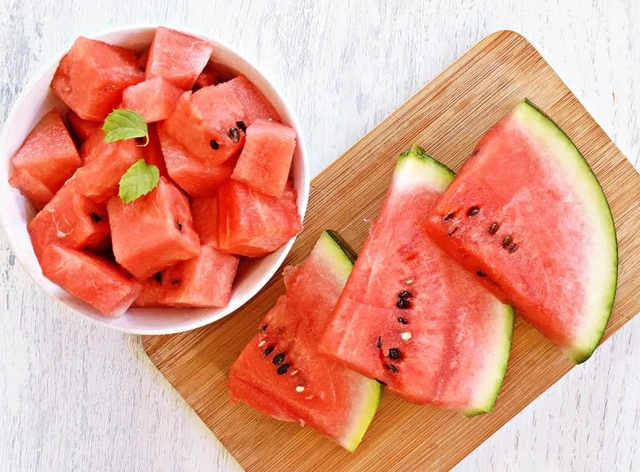
Watermelon is rich in antioxidants, lycopene, electrolytes and micronutrients such as potassium and magnesium.
Watermelon is rich in antioxidants, vitamins, electrolytes, and healthy micronutrients including vitamin C, lycopene, choline, potassium, magnesium, fiber, iron, and even calcium.
If you want to hydrate your skin, eat watermelon to make it more supple and radiant.
Despite its sweetness, watermelon is still a low-carb fruit due to its high water content.
8. Cantaloupe
2/3 cup of cantaloupe contains only 8.16 grams of total carbs. In addition to being low-carb, cantaloupe is also rich in vitamin A and vitamin C. According to the National Institutes of Health, vitamin A is good for your immune system and vision as well as your heart, lungs, and other organs, while vitamin C prevents colds and boosts your immune system.
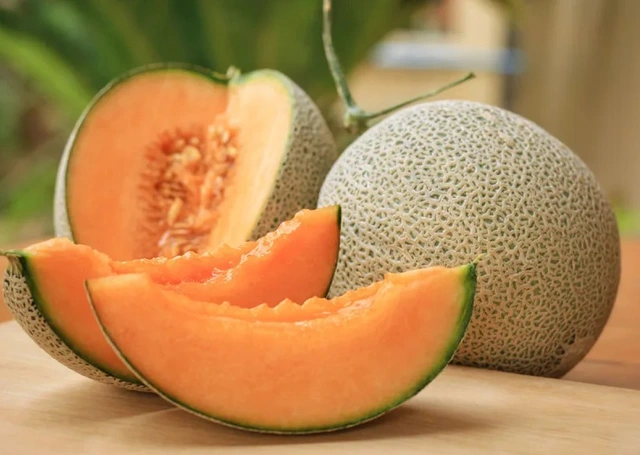
Cantaloupe hydrates the body, is good for the digestive system, and reduces the risk of high blood pressure.
9. Lemon
2/3 cup of lemon contains a total of 9.32g of carbs and 2.8g of fiber.
Normally, you can hardly eat lemon directly like other fruits. However, lemon is a very popular spice to enhance the flavor of meals. For example, you can make lemon juice, lemon tea or add lemon to other smoothies to enhance the flavor. Or you can use lemon to add to salad or boiled spinach water for summer meals.
10. Peaches
2/3 cup of peaches contains only 10.1 grams of total carbs. According to data published in the journal Food Reviews International, peaches are considered by some nutritionists to be medicinal, helping you prevent aging and chronic diseases. Peaches reduce the risk of obesity, diabetes, high blood pressure, as well as cardiovascular disease, neurodegenerative disease and cancer.





